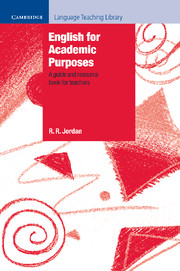Book contents
- Frontmatter
- Contents
- List of figures
- List of abbreviations
- Acknowledgements
- Introduction
- Part I English for Academic Purposes and study skills
- Part II Study skills and practice (EGAP)
- Chapter 9 Academic reading
- Chapter 10 Vocabulary development
- Chapter 11 Academic writing
- Chapter 12 Lectures and note-taking
- Chapter 13 Speaking for academic purposes
- Chapter 14 Reference/research skills
- Chapter 15 Examination skills
- Part III English for Specific Academic Purposes
- Appendices
- References
- Subject index
- Author index
Chapter 14 - Reference/research skills
Published online by Cambridge University Press: 10 November 2010
- Frontmatter
- Contents
- List of figures
- List of abbreviations
- Acknowledgements
- Introduction
- Part I English for Academic Purposes and study skills
- Part II Study skills and practice (EGAP)
- Chapter 9 Academic reading
- Chapter 10 Vocabulary development
- Chapter 11 Academic writing
- Chapter 12 Lectures and note-taking
- Chapter 13 Speaking for academic purposes
- Chapter 14 Reference/research skills
- Chapter 15 Examination skills
- Part III English for Specific Academic Purposes
- Appendices
- References
- Subject index
- Author index
Summary
Reference skills is an umbrella term that comprises a range of sub-skills relating to various types of reference materials. Sometimes the reference skills are sub-divided into language reference skills, which include the efficient use of dictionaries and books, and academic reference skills, which include library use, and giving references in dissertations and theses. Sometimes the label ‘research skills’ is used instead of ‘academic reference skills’: it might also include the keeping of record cards (or information on computer), on which to note books, journals and articles referred to, and the layout of research papers. Occasionally the term ‘study skills’ is used to refer to some of the more mechanical aspects of the above, but this is to be discouraged as it can be confusing. It will be seen that using a dictionary and the library are, in any case, far from being ‘mechanical skills’.
Dictionaries
Dictionaries may be monolingual or bilingual. Many students use bilingual or translating dictionaries, at least in the early stages of their studies; this is understandable. However, they will need to use monolingual dictionaries if they are to be advanced users of the language. The reason for this is that bilingual dictionaries often give a number of synonyms, and it may not be easy to select the most appropriate one. Good monolingual dictionaries give guidance on usage, style, and context of use.
- Type
- Chapter
- Information
- English for Academic PurposesA Guide and Resource Book for Teachers, pp. 208 - 218Publisher: Cambridge University PressPrint publication year: 1997



